Code:
char *color_name[] = {
"red",
"blue",
"green"
};
#define color_num (sizeof(color_name)/sizeof(char*))
int main(){
printf("size %d \n",color_num);
return 0;
}
It works fine with GCC 4.8.2 on Centos 7.
But I got error running above program on mac which says:
note:expanded from macro 'color_num'
Compiler on my Mac:
……include/c++/4.2.1
Apple LLVM version 6.1.0 (clang-602.0.49) (based on LLVM 3.6.0svn)
Target: x86_64-apple-darwin14.3.0
Thread model: posix
I've been told that GCC has been linked to Clang on Mac when it is used to compile program, am I right?
Qestion:
So why does Clang report that error? Is that concerning pre-processing?
And if I do this, it works fine:
int a = color_num;
printf("%d\n",a);
or:
printf("%d\n",sizeof(color_num)/sizeof(char*));
UPDATA=============
Crayon_277@Macintosh 20150525$ gcc -g -o ex11 ex1.c
ex1.c:16:21: warning: format specifies type 'int' but the argument has type 'unsigned long' [-Wformat]
printf("size %d\n",color_num);
~~ ^~~~~~~~~
%lu
ex1.c:14:19: note: expanded from macro 'color_num'
#define color_num (sizeof(color)/sizeof(char*))
^~~~~~~~~~~~~~~~~~~~~~~~~~~~~
1 warning generated.
It seems no error but just that format warning.
I think it may concerning the extension I use for vim scrooloose/syntastic
I got error from that:
